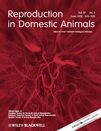
REPRODUCTION IN DOMESTIC ANIMALS
Scope & Guideline
Pioneering Research for Sustainable Agriculture
Introduction
Aims and Scopes
- Reproductive Physiology:
Research on the physiological mechanisms governing reproduction in domestic animals, including hormonal regulation, gametogenesis, and reproductive cycles. - Artificial Reproductive Technologies (ART):
Studies involving techniques such as artificial insemination, in vitro fertilization, and embryo transfer aimed at enhancing breeding efficiency and genetic improvement. - Genetics and Genomics:
Exploration of genetic factors influencing reproductive traits, including genetic mapping, genomic selection, and the role of specific genes in fertility. - Embryo Development and Quality Assessment:
Investigations into the factors affecting embryo quality, development, and viability, including the impact of environmental stressors and cryopreservation techniques. - Reproductive Disorders and Pathology:
Studies focusing on reproductive health issues, including endometritis, infertility, and the impact of infections on reproductive performance. - Nutritional and Metabolic Influences:
Research into how nutrition and metabolic conditions affect reproductive performance, embryo development, and overall health in domestic animals. - Innovative Technologies in Reproduction:
Application of new technologies and methodologies, such as molecular biology techniques and bioinformatics, to enhance understanding and improvement of reproductive outcomes.
Trending and Emerging
- Advanced Genetic Technologies:
There is a growing interest in the application of CRISPR and other gene-editing technologies to improve reproductive traits and animal health, indicating a shift towards precision breeding. - Microbiome and Reproductive Health:
Research exploring the role of the microbiome in reproductive health is on the rise, emphasizing its impact on fertility and overall reproductive success. - Non-invasive Monitoring Techniques:
Innovations in non-invasive monitoring methods, including the use of imaging technologies and biomarkers for assessing reproductive status, are increasingly prevalent in recent studies. - Stress and Reproductive Performance:
There is an emerging focus on how environmental and physiological stressors affect reproductive outcomes, highlighting the importance of animal welfare in reproductive success. - Sustainable and Ethical Breeding Practices:
Research on sustainable practices and the ethical implications of reproductive technologies is gaining traction, reflecting a broader societal concern for animal welfare and environmental sustainability. - Nutritional Genomics in Reproduction:
The intersection of nutrition and genomics in influencing reproductive performance is becoming a prominent area of research, indicating a holistic approach to animal reproduction.
Declining or Waning
- Traditional Breeding Practices:
There has been a noticeable decline in research focused on conventional breeding methods as emphasis shifts towards advanced reproductive technologies and genetic selection methods. - Basic Reproductive Physiology Studies:
Research that solely focuses on fundamental reproductive physiology without application to practical breeding or reproductive technologies seems to be less common, as there is a growing preference for applied research. - General Veterinary Reproductive Health:
Publications centered around general reproductive health issues without a specific focus on advancements or innovations are becoming less frequent, possibly due to the increasing specialization within veterinary reproductive sciences. - Historical Perspectives on Reproductive Technologies:
There is a reduced emphasis on historical reviews of reproductive technologies, as the field is moving towards more contemporary applications and innovations in reproductive management.
Similar Journals

Reproductive Medicine
Empowering Professionals through Open Access InsightsReproductive Medicine is an esteemed open-access journal published by MDPI, focusing on the latest research and advances in reproductive health, fertility, and assisted reproductive technologies. With its E-ISSN of 2673-3897, the journal aims to provide a platform for researchers, clinicians, and healthcare professionals to disseminate their findings, share innovative practices, and engage in scholarly discourse. Situated in Basel, Switzerland, Reproductive Medicine emphasizes a multidisciplinary approach, exploring biological, clinical, and psychological aspects of reproductive health. Although the journal is in the early stages of establishing metrics such as H-index and Scopus rankings, its open-access model enhances accessibility, allowing for a broad dissemination of knowledge. Committed to fostering advancements in the field, Reproductive Medicine is essential for those seeking to stay at the forefront of reproductive health research.
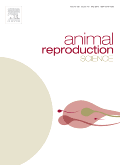
ANIMAL REPRODUCTION SCIENCE
Elevating Understanding of Reproductive PhysiologyANIMAL REPRODUCTION SCIENCE, published by Elsevier, is a leading journal dedicated to the field of animal reproduction and developmental biology. With an ISSN of 0378-4320 and an E-ISSN of 1873-2232, it serves as a vital resource for researchers, professionals, and students interested in advancing their understanding of reproductive mechanisms across various species. The journal has been recognized for its high-quality contributions, achieving a Q1 ranking in Animal Science and Zoology and showcasing its significant impact in the areas of Endocrinology and Veterinary Medicine as per the 2023 category quartiles. Covering a wide range of topics from reproductive physiology to genetic implications, this journal not only highlights innovative research but also fosters interdisciplinary dialogue in the rapidly evolving world of animal science. Though not currently offering open access, it remains a crucial platform for disseminating pivotal research findings from across the globe. With its rich history dating back to 1936, ANIMAL REPRODUCTION SCIENCE continues to drive excellence in animal reproduction studies, positioning itself at the forefront of the field, and solidifying its relevance in both science and industry.

Reproductive Biology and Endocrinology
Empowering Research in Reproductive Biology and EndocrinologyReproductive Biology and Endocrinology, published by BMC, is a distinguished open-access journal established in 2003, catering to researchers and professionals in the interdisciplinary fields of reproductive biology, endocrinology, and related biomedical sciences. With a notable impact in 2023, the journal has achieved Q1 rankings in Obstetrics and Gynecology, Reproductive Medicine, and Endocrinology, alongside a Q2 ranking in Developmental Biology, establishing itself as a pivotal source of high-quality research and insights. The journal's commitment to freely accessible research promotes knowledge dissemination across its domains, which is crucial for advancing understanding of reproductive health and endocrine mechanisms. With a robust Scopus ranking showcasing its relevance—17th out of 209 in Obstetrics and Gynecology, and 8th out of 90 in Reproductive Medicine—it serves as an essential resource for academics and clinicians alike, facilitating innovative research and fostering collaboration within the global scientific community.
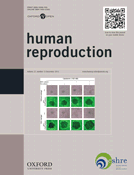
HUMAN REPRODUCTION
Pioneering insights for a healthier future in human reproduction.HUMAN REPRODUCTION is a prestigious academic journal published by Oxford University Press, dedicated to advancing the field of reproductive medicine. With an impressive impact factor highlighting its significance, the journal ranks in the top quartile (Q1) for Obstetrics and Gynecology, Rehabilitation, and Reproductive Medicine, showcasing its crucial role in disseminating high-quality research. Founded in 1986, it has become a key resource for researchers, practitioners, and students interested in cutting-edge developments and innovative practices in human reproduction. Despite not currently offering open access, the journal continues to publish a wealth of peer-reviewed articles that contribute substantially to clinical knowledge and practice. With Scopus rankings placing it among the top journals in its categories, HUMAN REPRODUCTION remains an essential platform for discussion and dissemination of vital findings impacting reproductive health globally.

Human Reproduction Open
Advancing reproductive health through open access.Human Reproduction Open, published by Oxford University Press, is a prestigious open-access journal dedicated to advancing the field of reproductive health and medicine since its inception in 2017. With an E-ISSN of 2399-3529, the journal provides a vital platform for researchers, clinicians, and academics to disseminate innovative findings in obstetrics, gynecology, and reproductive medicine. It is recognized for its impactful contributions, holding an impressive rank of #3 out of 209 in Medicine - Obstetrics and Gynecology, #2 out of 90 in Medicine - Reproductive Medicine, and #1 out of 21 in Medicine - Embryology, placing it in the top percentiles of its respective categories. The open-access model ensures that research is freely accessible, fostering collaboration and knowledge sharing among professionals and students alike. With a commitment to high-quality, peer-reviewed publications, Human Reproduction Open plays a crucial role in shaping the future of reproductive health research and practice, serving as an essential resource for those dedicated to improving outcomes in this dynamic field.
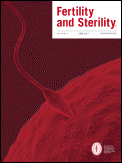
FERTILITY AND STERILITY
Transforming understanding of fertility issues.Fertility and Sterility is a prestigious peer-reviewed journal dedicated to the fields of obstetrics, gynecology, and reproductive medicine. Published by Elsevier Science Inc, this journal has been a cornerstone of scientific discourse since its inception in 1950 and is set to continue its influential coverage of cutting-edge research until 2024. Boasting an impressive impact factor, Fertility and Sterility is ranked among the top-tier journals in its category, holding Q1 status in both Obstetrics and Gynecology and Reproductive Medicine. With Scopus rankings placing it in the 97th and 96th percentiles respectively, the publication serves as a vital resource for researchers, clinicians, and students who seek to advance their understanding of fertility issues and reproductive health. Although it does not currently offer open access options, the journal remains committed to disseminating high-quality research and innovative solutions to the complex challenges in reproduction, empowering professionals and scholars to make meaningful contributions in their fields.
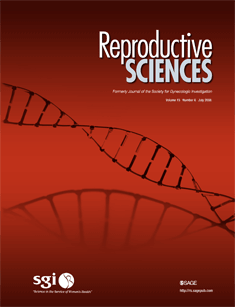
Reproductive Sciences
Advancing Knowledge in Reproductive HealthReproductive Sciences is a premier journal published by SPRINGER HEIDELBERG, dedicated to the field of obstetrics and gynecology. With its ISSN 1933-7191 and E-ISSN 1933-7205, the journal has established itself as a leading source of high-quality research and clinical insights since its inception in 2007, and continues to converge its scope into 2024. Currently ranked in the Q1 category for obstetrics and gynecology, it holds the 43rd position among 209 journals in the Scopus rankings, underscoring its influence and relevance within the medical community. This journal is particularly dedicated to advancing knowledge in reproductive health, providing a platform for innovative research and clinical practices through both traditional and open access options. Located in Switzerland with an address in Heidelberg, Germany, Reproductive Sciences is not just a publication; it is a vital resource for researchers, professionals, and students seeking to make impactful contributions to the field of reproductive health.
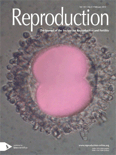
REPRODUCTION
Pioneering discoveries in reproductive and developmental biology.REPRODUCTION, published by BIOSCIENTIFICA LTD, stands at the forefront of research in the fields of reproductive and developmental biology. With a focus on advancing our understanding of reproductive health and mechanisms, the journal has garnered an impressive reputation, consistently ranking in the first quartile for key categories including Embryology, Endocrinology, Obstetrics and Gynecology, and Reproductive Medicine in 2023. Notably, it holds an esteemed position in the Scopus rankings, with high percentiles that reflect its significant impact in the scientific community. The journal is committed to open access, promoting the broad dissemination of high-quality research to facilitate innovative discoveries and interdisciplinary collaboration. Situated in the United Kingdom, REPRODUCTION serves as a vital resource for researchers, professionals, and students eager to contribute to the evolving landscape of reproductive sciences and related fields.

Reproduction and Fertility
Shaping the future of obstetrics and gynecology.Reproduction and Fertility is a premier academic journal published by BIOSCIENTIFICA LTD, dedicated to advancing knowledge in the fields of reproductive sciences, obstetrics, gynecology, and related areas. Established with a focus on delivering high-quality research, this journal has quickly ascended in prominence, achieving a commendable Q2 ranking in multiple categories, including Embryology, Obstetrics and Gynecology, Reproductive Medicine, and Urology, as of 2023. With an E-ISSN of 2633-8386, Reproduction and Fertility aims to provide a valuable platform for researchers, professionals, and students alike, offering insights into the latest discoveries and innovations in reproductive health. Although currently not an open-access journal, it remains committed to disseminating important findings that can influence clinical practices and policy-making worldwide. Operating from its headquarters in Bristol, United Kingdom, the journal serves as an essential resource for anyone invested in understanding and improving reproductive health outcomes through rigorous academic research.
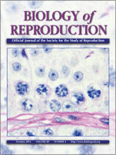
BIOLOGY OF REPRODUCTION
Pioneering Insights into Reproductive ProcessesBIOLOGY OF REPRODUCTION is a premier journal published by Oxford University Press Inc, dedicated to advancing research in the fields of reproductive biology, cell biology, and reproductive medicine. With an impressive impact factor and a strong ranking as Q1 in reproductive medicine and miscellaneous medicine, as well as Q2 in cell biology, this journal offers a vital platform for disseminating innovative findings and pivotal studies that shape our understanding of reproductive processes. Since its inception in 1969, BIOLOGY OF REPRODUCTION has become a key resource for scientists, clinicians, and students alike, providing insights that drive the future of reproductive health and research. Although not an open-access publication, it remains a respected authority, reflecting a commitment to high-quality peer-reviewed articles. The journal's comprehensive scope includes molecular and cellular aspects of reproduction, reproductive health, and associated technologies, making it indispensable for professionals looking to stay at the forefront of breakthroughs within the field.